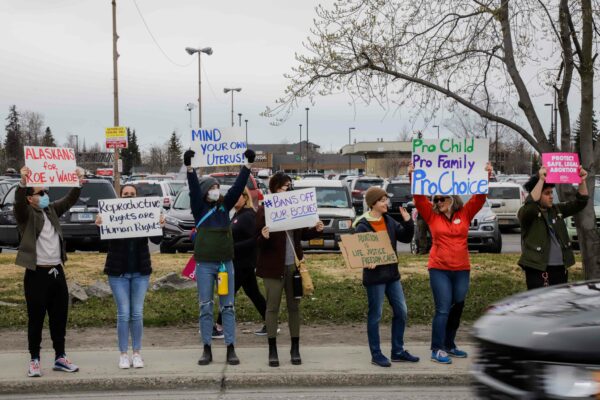
A leaked opinion from the Supreme Court shows it is likely to overturn the landmark abortion decision, Roe v. Wade. Abortion advocates are calling on Congress to act, and with the special election for U.S. House underway in Alaska, abortion has become a hot-button political issue this election season.
Alaska Public Media Washington correspondent Liz Ruskin recently spoke with Alaska News Nightly host Casey Grove about where the candidates stand on the issue.
Listen:
[Sign up for Alaska Public Media’s daily newsletter to get our top stories delivered to your inbox.]
The following transcript has been lightly edited for clarity.
Casey Grove: Liz, remind us, why is this a question for the Congress?
Liz Ruskin: Well, it’s not necessarily. But Roe established a right to abortion. If Roe falls, states will be able to ban the procedure unless Congress passes a law mandating that abortion be legal nationwide. So that’s why it’s a question for Congress and why you hear lawmakers and candidates talk about codifying Roe, meaning putting abortion rights in U.S. code.
CG: Okay, so we’ve got 48 candidates in this special election for U.S. House. I imagine their views are all over the place?
LR: Yes. And we know that a lot of voters do look to where a candidate stands on abortion to make their decision. Nonpartisan candidate and gardener Jeff Lowenfels says he’s had more questions about abortion than any other topic.
Jeff Lowenfels: Lots and lots and lots of emails and texts. And all asking the same question and I gave him all the same answer: “It’s none of the government’s business whatsoever. It’s entirely up to the woman and I support Roe v. Wade.” I think I’d probably change that answer a little bit after the shooting last night.
CG: He’s referring to the school shooting in Texas.
LR: Yeah, Lowenfels is linking more restrictive gun laws to the abortion issue.
JL: As far as I’m concerned, you know, gun control is my right to life.
LR: What Lowenfels means is, if you care about life, you should pass laws to prevent mass shootings rather than blocking access to abortion. And at the other end of the spectrum, we’ve got several candidates like John Coghill, who oppose abortion in nearly all circumstances. Coghill says human life begins at conception and doesn’t think abortion should be legal even when pregnancy results from rape. The only exception Coghill supports is if abortion would save a woman’s life.
John Coghill: There are some really, really sad circumstances that people have to deal with at the hospital. And, at that point, it really should be between a good health care provider and that woman. And so that’s where me and the pro-life crowd part company probably.
CG: Well, we’ve got 46 other candidates. How do we sort through them?
LR: On the abortion rights side, we’ve got, among others, all the registered Democrats. That is Chris Constant, Mike Milligan, Mary Peltola, Ernest Thomas, Adam Wool, Emil Notti. Notti is interesting. He says he’s in favor of states rights. So that would preclude Roe. But Notti says, on a state level, he thinks abortion should be legal.
We asked all 48 candidates where they stood on abortion rights. Read their responses.
CG: Interesting, but some of the Republicans and nonpartisans also favor abortion rights, correct?
LR: Yeah, a lot of the nonpartisans including Al Gross and Santa Claus say women should have access to legal abortion, and among Republicans a few support abortion rights. For instance, Tara Sweeney says the federal government shouldn’t have a role in women’s health care decisions.“While I support a woman’s right to choose,” Sweeney says, “I oppose late-term abortions except in cases where a woman’s life or health is in jeopardy.”
CG: That leaves a lot of Republicans in this U.S. House race, what, in favor of making abortion illegal?
LR: Well, some didn’t answer our survey question. Some answered with responses that are hard to categorize. I can tell you that two of the prominent Republicans, Sarah Palin and Nick Begich, both identify themselves as pro-life meaning they’re against abortion rights.
CG: Liz, didn’t the U.S. House already pass a bill to codify Roe, but just this month the Senate’s version was blocked? So how likely is this to come up again, in this short-term to fill out Don Young’s term until January?
LR: Yeah, it’s possible this would still be an issue in this term of Congress. If, for instance, the Senate passed a less comprehensive abortion rights bill than the House version, and then the House would have to approve it. But this isn’t likely to occur, because, you know, it’s really hard to find compromise on anything — but especially abortion.
Liz Ruskin is the Washington, D.C., correspondent at Alaska Public Media. Reach her at lruskin@alaskapublic.org. Read more about Liz here.
Casey Grove is host of Alaska News Nightly, a general assignment reporter and an editor at Alaska Public Media. Reach him atcgrove@alaskapublic.org. Read more about Caseyhere.






